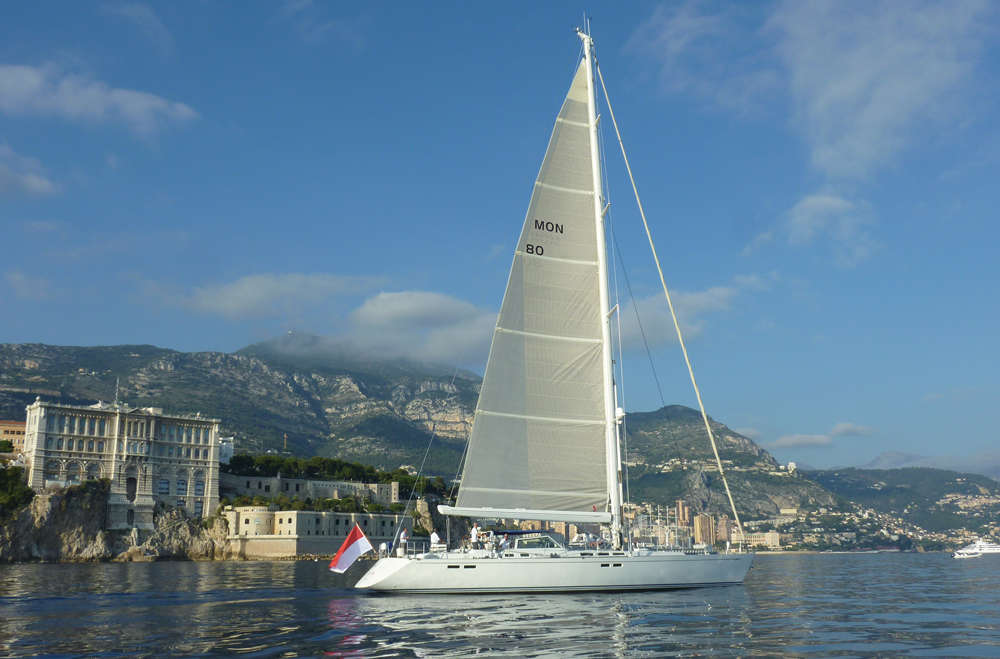Your Local Broker, Internationally
Berthon UK
(Lymington, Hampshire - UK)
Sue Grant
sue.grant@berthon.co.uk
0044 (0)1590 679 222
Berthon Scandinavia
(Henån, Sweden)
Magnus Kullberg
magnus.kullberg@berthonscandinavia.se
0046 304 694 000
Berthon Spain
(Palma de Mallorca, Spain)
Simon Turner
simon.turner@berthoninternational.com
0034 639 701 234
Berthon USA
(Rhode Island, USA)
Jennifer Stewart
jennifer.stewart@berthonusa.com
001 401 846 8404
RESIDUAL YACHT VALUE and the cost of having fun | 2018

‘Water-skies attached to her rear’
Residual value is something that exercises yacht buyers hugely. When embarking upon the adventure of yacht ownership there is the excitement of finding the right yacht for the yachting plans that you have in mind. Of course the yacht also has to make your heart sing and she also has to fit the expectation of other members of your cruising team. Residual value then also raises its head and in some cases plays its part as a giant sized spoiler of the fun.
However much the adventure or programme that you have in mind is important and it is indispensable that the yacht must be right for this, it is always sensible to think about your ultimate exit, when the programme is completed and it is time to hand the yacht onto her next owner.
In planning for this, it is an essential truth that a good buy is never crystallised until disposal and so however super the deal might be that you have done for the yacht of your dreams, if no one wants to buy her when you wish to sell, suddenly this good buy is simply a question of money paid for a project now completed. Worse than this, it is dead money and a continuing liability as the yacht still needs to be berthed, insured and maintained when you are through with her until she is sold.
A good yacht broker is able to advise on residual value as they are able to use their understanding of the market and know what is hot and what is rather more chilly. Trends do change but most yacht owners change their yachts often enough that this is something we can give reasonably informed advice about. However, if you hold your yacht for say 10 years, please do not expect the market to have remained as it was when you purchased her. Please also do not be cross with the broker that told you that she would be easy to resell, as 10 years on fashions have changed, the yacht has hopefully done much, and whilst forward guidance is a skill that is part of the yacht brokers’ craft, our skills with a crystal ball are woefully poor that far into the future. The normal buy/sell cycle is 3 to 5 years, and in some segments such as the sports boat market this can be as little as 36 months.
It is our feeling that yacht owners give yachts a very hard time when it comes to residual value. We have all heard the one about – yacht ownership is like standing under a shower fully clothed and tearing up £50 notes. Or – yachts are a depreciating asset unlike property, stocks and shares and virtually anything else that you care to name…..
Really?
There have been many occasions during which we have been asked to value a yacht for sale and together with information and imagery about the yacht appears the full costings from the owner for the yacht since the date of purchase. Insurance, berthing and all maintenance is added onto the value of the yacht when purchased in order to arrive at the net selling figure that he or she would be happy with……
It is very good practise to keep records of all the work carried out to your yacht. It provides a good basis for the ongoing care of the yacht and shows that systems have enjoyed regular maintenance which increases the life of the moving parts and therefore increases reliability. When the time comes to sell her, purchasers will like the fact that the yacht has been well cared for as it decreases their risk levels and speaks of ongoing reliability. However, these costs are part of owning and enjoying a yacht. They are not the concern or cost of the next owner – you don’t add the cost of servicing your car or painting your house, when you put these on the market, so it isn’t really fair to do this with your yacht when you sell her.
Of course, yachts are complex pieces of machinery, operating in a corrosive environment and are highly stressed. This applies to performance sailing and power yachts for sure, but all yachts have to withstand a lot from a powerful and dangerous help mate without whom they couldn’t do it – the sea……
This means that aside from the comfort and reliability aspects, – looking after your yacht carefully is critical from a safety perspective and if she is to save your life and – you have to return the compliment by keeping up with maintenance and renewal.
Some yacht owners seem to think that electronics, sails, batteries, major overhaul of machinery, watermaker membranes, new rigging, paint and the like, are improvements to a yacht. They are not. They are consumables and one must expect to take these costs on the chin and accept that they are part of yacht ownership. They are what you do to your yacht to help her to take care of you.
Of course there are higher cost items which are improvements to a yacht and a new owner can buy at a good price knowing that she needs new teak decks for example. The full cost of a high capital expenditure like this is unlikely to be recouped in full. However, the cheque writer is the person who will enjoy the pristine honey colour of his yacht’s new acquisition and the admiring glances that come with this, as well as the relief of knowing that all those irritating little deck leaks and lumps have been dealt with during the fitting process, and that the deck layout is now absolutely as he or she, likes. At least a proportion of the hard cash that went to pay for a new deck, is repaid to the yacht’s owner in the enjoyment of a yacht without lifting planks and unsightly caulking leering from the rebates and crawling out of it whenever it is given the chance.
However, the most important part of the monetary equation is that of fun to the £, the bang for your buck, as it were. You don’t buy a yacht to be an investment. You buy her to regatta her, or to roar around at high speed – maybe with water skiers attached to her rear. Or maybe you buy her to cruise oceans and to go far – or perhaps you cruise to switch off and to enjoy the beauty of your local cruising waters.
However you use your yacht, if you didn’t own her you would be chartering, staying in a hotel, or perhaps engaged with another hobby – all of which would still need to be paid for with hard cash.
For blue water cruising yachts in particular, their owners enjoy incredible value for money as in many cases the yacht becomes their home (enabling them in some cases to rent their land home and gain an income), she is also their magic carpet to incredible places and their digs when in famous and expensive locations. Much is talked about the cost of marina berthing – but mostly this is trivial in comparison to the 6 star hotel somewhere very close by – and I bet that the view is better…. She is also the platform from which to entertain family and friends and a great way to return hospitality in a much appreciated and unique way.
Of course some owners charter their yachts. This is not at all like renting your house. The yacht has to comply with a myriad of regulations, normally needs a captain and chef aboard and the volume of charters rarely keeps up with the cost of running the yacht in such an elaborate manner. However, it does guarantee that she remains in top order and that she has a programme which keeps the crew interested and engaged. On a crewed yacht this is something that it is important to think about.
A new yacht will sell typically after 5 years for around 50% of her original build cost. That sounds awful…..what a terrible investment….
The truth is that it is up to the yacht owners whether it is good or bad. If she has had little use and they have had little fun for their £s, $s or €s then yes, that is totally true.
However, if she is a planing motor yacht which has cruised Northern Europe and the Med which has had legions of friends and family aboard, many parties and the opportunity to see Les Voiles or may be an Americas Cup or two, has anchored in incredible areas and been there at hometime after the most incredible meals…… how is that bad value?
A house doesn’t take you to the Galapagos or the Bahamas. It is hard to water ski behind a car. A portfolio of equities is a noble thing – but it doesn’t go to windward and to be frank, it simply isn’t all that much ……..fun…..
So do beware of buying a yacht with a dodgy residual value. If she is constructed of concrete from a yard that also build piggeries, or is a one off from a designer that is a nice bloke that no one has heard of, or if there are serious structural problems or unusual kit that is going to be a nightmare to service, please do think very carefully about the level of the fun quotient you are likely to have as her owner.
When you find the yacht that makes your heart beat that little faster, meets the brief for your proposed adventures and which the family think is actually pretty cool, subject to survey, normal title checks and the rest, she is quite probably the one. Do use her much, and extract the maximum fun from every day of your ownership of her. Look after her well and be realistic about value on resale, bearing in mind not what she is but where she has taken you and the experiences with family and friends that you have enjoyed.
Add the fun quotient to the depreciation value and you may well find that she was not such a bad investment after all….
For the rest, the reality is that if you fall in love, her next owner is highly likely to do so too. However whilst she is in your care, please do cherish her. Not only will this increase her reliability and therefore your level of enjoyment, it will also make her an easier sell.
Do be realistic about the important jobs that really do need to be done – rig, decks, batteries and the rest. The buyer may well be willing to listen to your theories on the subject but this will cut absolutely no mustard with his pre-purchaser surveyor or his intended insurers who will want this stuff fixed before she goes to sea.
Consider doing what a good client of Berthon who bought and sold many yachts always did. He would adjourn to the yacht for an evening with a good bottle of scotch, and remember all the adventures, great landfalls and parties, as well as the difficult passages that she had brought him safely through. The following day we would set the price after he had properly considered the amount of fun to the £ that his yacht had delivered and in this way whilst he never got back what he paid, he always got value.

Marten 80′ – NIMROD
